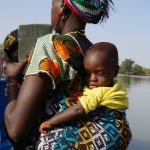 Senegal is a country with large gender disparities in education and career opportunities. Early marriage and low age at first birth greatly impede women’s career prospects. A study by Francesca Marchetta and David E. Sahn, conducted under the GLM-LIC program supported by DFID and IZA, provides some important insights into opportunities for improving the well-being of Senegalese women.
Senegal is a country with large gender disparities in education and career opportunities. Early marriage and low age at first birth greatly impede women’s career prospects. A study by Francesca Marchetta and David E. Sahn, conducted under the GLM-LIC program supported by DFID and IZA, provides some important insights into opportunities for improving the well-being of Senegalese women.
The authors simultaneously estimated four key decisions in a woman’s life course, i.e. the level of education, the age at marriage, the age at first birth, and the age at entry into the labor market. The results show that parents’ education has a powerful impact on schooling attainment of their daughters. Interestingly, father’s education seems to matter more.
The study also sheds light on the relationships between these four interrelated decisions, in particular the effect of schooling on the other outcomes. It appears that the number of completed grades among young women is important in delaying the age at marriage and, consequently, at first birth.
Most development interventions designed to prevent early childbearing aim at changing sexual behaviors through increasing contraception use or through education programs. The results of this paper also lend support to policies aimed at reducing early marriage directly, e.g. through laws that ban marriage of very young girls, or indirectly through cash transfer programs. This would facilitate labor market entry, and more generally promote greater opportunities for young women.
